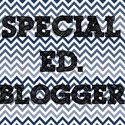Small Group Writing
November 23, 2012
I don't teach writing. When I say this, I mean, I don't teach the writing process. Two years ago, my building began a journey to increase our state assessment writing scores and a teacher stumbled upon Every Child a Writer. Since then most of my fellow teachers have been trained in ECAW. We use it as a resource as we have a district mandated curriculum that we all use. Our of district says that Writer's Workshop is core instruction, so by the nature of how workshop works I don't teach writing. But I do teach students how to write in complete sentences and how to write about what they read.
Many of my students have a difficult time taking their verbal thoughts and putting them in writing. So, I've been working on creating scaffolded paragraphs for them to use depending on what kind of text they have been reading. These have also helped my English Language Learners.
What is National Literacy Coalition's “Every Child a Writer?”
Every Child a Writer (ECAW) is based on the Australian genre-based approach to writing. Through direct instruction and joint construction of text, students master descriptive, explanation, instruction, persuasive, and narrative writing.
Demonstrated Writing
 Demonstrated Writing offers students a daily glimpse into the thinking of the fluent writer in action. The teacher demonstrates the writing process by planning and crafting written products in the five major genres of writing (descriptive, explanation, instruction, persuasive, and narrative). Focusing on the writer’s process, the teacher models the “think-aloud” strategy, while composing for his or her students. This daily demonstration leads to small-group instruction focused on specific skills, or targets, for each group.
Demonstrated Writing offers students a daily glimpse into the thinking of the fluent writer in action. The teacher demonstrates the writing process by planning and crafting written products in the five major genres of writing (descriptive, explanation, instruction, persuasive, and narrative). Focusing on the writer’s process, the teacher models the “think-aloud” strategy, while composing for his or her students. This daily demonstration leads to small-group instruction focused on specific skills, or targets, for each group.
Differentiated Writing
Differentiated Writing, the joint construction of text,
is when the teacher and a small group of students work together to compose written products within a given genre. Instructional targets are differentiated in response to the needs of the group, and the teacher “scaffolds” their instruction, gradually releasing control and responsibility as students gain skills and confidence. Instructional targets focus on techniques for planning, organization, vocabulary usage, sentence and paragraph structure, and conventions/mechanics (including spelling).
is when the teacher and a small group of students work together to compose written products within a given genre. Instructional targets are differentiated in response to the needs of the group, and the teacher “scaffolds” their instruction, gradually releasing control and responsibility as students gain skills and confidence. Instructional targets focus on techniques for planning, organization, vocabulary usage, sentence and paragraph structure, and conventions/mechanics (including spelling).
Directed Writing
Directed Writing gives students daily opportunities for practice of the genre and instructional targets taught in the Differentiated Writing group. From plan development to drafting, revising, editing, conferencing, and publishing, students have regular opportunities to independently apply their new skills within topic areas of personal interest and experience. A central feature of the Directed Writing component is the provision of instructional time for a variety of writing conferences including small group and partner conferencing. In this way, students are prepared for genuine independence as developing writers.
Here is a sampling of the ones I have used with my small groups. I use them to focus the students comprehension but wanting them to write about they have been reading as well as talking about the book. I'm working on more that focus more on ECAW. Don't forget about the sale next Monday and Tuesday at the TpT store and extra 20% off everything in my store.

Here is a sampling of the ones I have used with my small groups. I use them to focus the students comprehension but wanting them to write about they have been reading as well as talking about the book. I'm working on more that focus more on ECAW. Don't forget about the sale next Monday and Tuesday at the TpT store and extra 20% off everything in my store.

Labels:writing
Subscribe to:
Post Comments
(Atom)

About Me
Welcome to my all thing special education blog. I empower busy elementary special education teachers to use best practice strategies to achieve a data and evidence driven classroom community by sharing easy to use, engaging, unique approaches to small group reading and math. Thanks for Hopping By.
Resource Library
Thank you! You have successfully subscribed to our newsletter.
Search This Blog
Labels
21st Century
Autism
Bloom's Taxonomy
DIBELS
ELL strategies
Formative Assessment
Fountas and Pinnell
Guided Reading
IEP
Just Words
Progress monitoring
RTI
Reading Comprehension
Wilson Reading System
apps
back to school
beginning readers
best practices
books to read
classroom
common core
comprehension
data
differentiation
fluency
freebie
intervention
lesson plan
math
parents
phonics
reading
small group
special education
teaching
technology
vocabulary
writing











Hi Alison, I nominated you for the Liebster Award! Come on over to my blog to find out all the details.
ReplyDelete?Resource Room Rules
Hi Alison, I'm thinking about using ECAW next year in my first grade classroom. Would you still recommend it? Do you still use it? I've been using Writer's Workshop for 19 years. But, some children just don't seem to make the progress that I would like them to make. I'm hoping that ECAW is the answer. What do you think?
ReplyDeleteThanks,
Vicki
I use ECAW for small groups. I think it works best with the writing process. Its like reading finding the balance between the art and the science of teaching writing. I have seen great growth with students and transfer to our state assessments as well!! My students love it.
ReplyDeleteAlison